LeBolt: Five simple tests to identify increased risk of ACL tear
(Originally published in January 2015)
PHILADELPHIA — From the look on the girl’s face I knew she had been dragged over to my Fit2Finish Booth at the NSCAA (now United Soccer Coaches) Convention.
A beaming, athletic teenager, she stood between a couple of caring parents wearing very concerned expressions.
The Mom introduced me to her daughter: player of the year, committed to a top college soccer program, only a junior but she hasn’t torn her ACL.
Yet.
The word, unspoken, hovered heavily in the air.
“You’re a PhD, right? What can you tell us about keeping her from getting injured? She still has another year to go.”
This family, two parents who love their daughter and hope desperately to keep her dream alive, are like so many others who have called, emailed and met me on fields across the region.
They are the reason I started Fit2Finish in the first place.
There in a 10×10 booth I took her (she in stylish leggings and boots) through several exercises which I have found signal the warning signs for knees at risk of ACL tears.
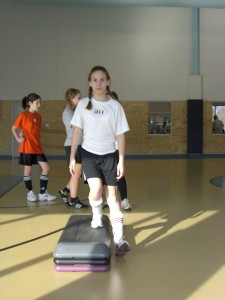
Proper knee position, knee bent straight over toes, hips stay square.
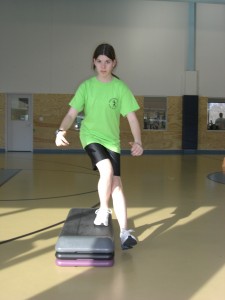
Improper knee position, knee bent inward and hips sway side to compensate.
Here are five exercises every coach and every parent can and should do with their players.
1. One-legged squats
One-legged squat off an 8- to 12-inch box or step. Knee should drop straight over the toe and not bow inward. (tests hip and torso strength)
2. Russian Hamstring
Start at kneeling with laces toward the ground and ankles secured by a partner. Lean forward as far as possible under control without bending from the waist, then recover to upright kneeling. (tests hamstring strength)
3. Russian Hamstring, Modified
Lean 45 degrees right, then 45 degrees left. Ask the athlete which way is easier. (isolates lateral component of hamstring group)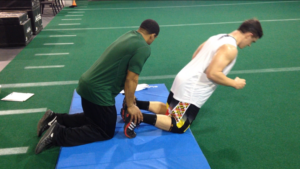
4. Side Plank
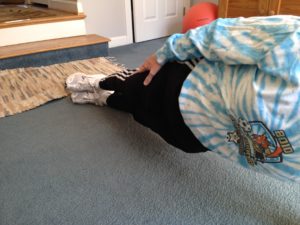
Side plank on elbow, head neutral. Be sure hips are square and there is no bend at the waist. (tests core, 360 torso strength)
Support the body in a side-lying position, on elbow bent 90 degrees, and feet stacked with ankles flexed and head in neutral position. Have the athlete press up and hold. The body is in a straight line with hips extended and torso tight. Perform on both sides of the body. (highlights functional core strength throughout the torso)
5. Y Balance Test
Stand at center of the Y formed by a line straight ahead and two lines extending backward from it at 45 degree angles. Test reach in three directions with each leg. (tests dynamic postural control and ankle dorsi-flexion) (video here)
These five tests will identify weaknesses in each individual player, even without expensive equipment.
Ask the athlete to report how the exercise feels and compare right versus left. They know immediately when one side out-performs the other, and they’ll tell you. Then, give the weak side extra attention.
The key to injury prevention in our players is balance. They need to have balanced strength, balanced flexibility, in 360-degree motion, 100 percent of the time.
That requires not only that they train it, but that they train it with game-like movement.
Fit2Finish specializes in using resistance bands to provide a feedback loop for dynamic strength training. Of course, they are also excellent for flexibility training.
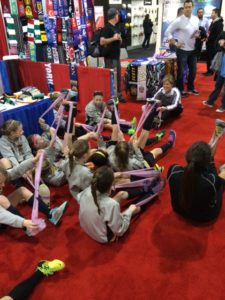
Flash mob of U10s including their coach jumped in to stretch with the bands on the NSCAA convention exhibitor’s floor.
Sometimes that draws a crowd or even a flash mob right on the exhibit floor!
The dimming of the lights of the Exhibit Hall signaled closing time, so our ACL prevention session was brief.
“Keep everything square, everything balanced,” I told the young athlete.
“Everything square?” her mother asked, obviously confused. “Do you understand what she means?” The girl nodded and smiled at me as we shook hands.
What a privilege it was to meet her. And an honor to be trusted with such an important question.
It felt a little bit like the reason why I came.
SOCCERWIRE MARKETPLACE
- visitRaleigh.com Showcase Series 2025, hosted by NCFC Youth
- OFFICIAL MANCHESTER CITY SOCCER CAMPS
- Wanted Licensed Youth Soccer Coach
- Join Official Elite Summer Soccer Camps with Europe’s Top Pro Clubs!
- The St. James FC Travel Staff Coach - North (Loudoun) & South (Fairfax)
- The St. James FC Girls Academy (GA) Head Coach - 2 teams
- The St James FC Boys Travel Tryouts
- OFFICIAL BAYERN MUNICH SUMMER CAMPS U.S.
- JOIN THE ALLIANCE!
- OFFICIAL FC BARCELONA CAMPS U.S.












